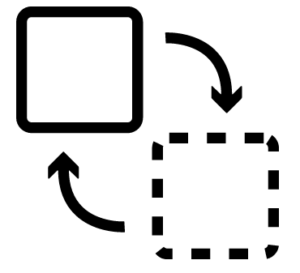16 Antecedent Clarity
 We’ve already defined an antecedent as the noun (or phrase) that a pronoun is replacing. The phrase “antecedent clarity” simply means that is should be clear who or what the pronoun is referring to. In other words, readers should be able to understand the sentence the first time they read it—not the third, forth, or tenth. In this page, we’ll look at some examples of common mistakes that can cause confusion, as well as ways to fix each sentence.
We’ve already defined an antecedent as the noun (or phrase) that a pronoun is replacing. The phrase “antecedent clarity” simply means that is should be clear who or what the pronoun is referring to. In other words, readers should be able to understand the sentence the first time they read it—not the third, forth, or tenth. In this page, we’ll look at some examples of common mistakes that can cause confusion, as well as ways to fix each sentence.
Let’s take a look at our first sentence:
Rafael told Matt to stop eating his cereal.
When you first read this sentence, is it clear if the cereal Rafael’s or Matt’s? Is it clear when you read the sentence again? Not really, no. Since both Rafael and Matt are singular, third person, and masculine, it’s impossible to tell whose cereal is being eaten (at least from this sentence).
How would you best revise this sentence? Type your ideas in the text frame below, and then look at the suggested revisions.
[practice-area rows=”4″][/practice-area]
Show Possible Revisions
Let’s assume the cereal is Rafael’s:
- Rafael told Matt to stop eating Rafael’s cereal.
- Matt was eating Rafael’s cereal. Rafael told him to stop it.
What if the cereal is Matt’s?:
- Rafael told Matt to stop eating Matt’s cereal.
- Matt was eating his own cereal when Rafael told him to stop.
These aren’t the only ways to revise the sentence. However, each of these new sentences has made it clear whose cereal it is.
Were those revisions what you expected them to be?
Let’s take a look at another example:
Zuly was really excited to try French cuisine on her semester abroad in Europe. They make all sorts of delicious things.
When you read this example, is it apparent who the pronoun they is referring to? You may guess that they is referring to the French—which is probably correct. However, this is not actually stated, which means that there isn’t actually an antecedent. Since every pronoun needs an antecedent, the example needs to be revised to include one.
How would you best revise this sentence? Type your ideas in the text frame below, and then look at the suggested revisions.
[practice-area rows=”4″][/practice-area]
Show Possible Revisions
Let’s assume that is is the French who make great cuisine:
- Zuly was really excited to try French cuisine on her semester abroad in Europe. The French make all sorts of delicious things.
- Zuly was really excited to try the cuisine in France on her semester abroad in Europe. The French make all sorts of delicious things.
- Zuly was really excited to try French cuisine on her semester abroad in Europe. The people there make all sorts of delicious things.
- One of the things Zuly was really excited about on her semester abroad in Europe was trying French cuisine. It comprises all sorts of delicious things.
As you write, keep these two things in mind:
- Make sure your pronouns always have an antecedent.
- Make sure that it is clear what their antecedents are.
Practice
Use the context clues to figure out which pronoun to use to complete the sentences. Select the response from the list that best completes the sentence.
- Alex and Jordan went for a bike ride and stopped for lunch. When the waiter came, (Jordan / he / she) knew what she wanted to order but (Alex / he / she) did not.
- Because (Jordan / she) loves cheese, (Jordan / she) ordered a slice of pizza.
Show Answer
- Alex and Jordan went for a bike ride and stopped for lunch. When the waiter came, Jordan knew what she wanted to order but Alex did not. (We cannot use a pronoun until we know the person. In this case, repeat the name. Note the she gives us the clue that Jordan is female.)
- Because Jordan loves cheese, she ordered a slice of pizza. (Mention noun before using the pronoun.)
Let’s try a more complicated paragraph:
- Edward is a year older than his brother Alphonse. When (he / Edward) graduated high school, he took a gap year so that (he / Edward) could travel and study sciences not offered at the local college. (He / Alphonse) was so jealous that (he / Alphonse) also took a gap year when he graduated.
Show Answer
- Edward is a year older than his brother Alphonse. When Edward graduated high school, he took a gap year so that he could travel and study sciences not offered at the local college. Alphonse was so jealous that he also took a gap year when he graduated.

